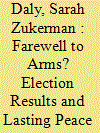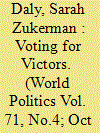| Srl | Item |
| 1 |
ID:
183652


|
|
|
|
|
| Summary/Abstract |
Why does fighting recur after some civil conflicts, whereas peace consolidates following others? The untested conventional wisdom is that—absent safeguards—postwar elections are dangerous for peace because electoral losers will reject the election results and remilitarize. New cross-national data on postwar election results and belligerent-level data on remilitarization contest this view. Citizens tend to elect peace because they engage in “security voting”; they elect the party that they deem best able to secure the state, using the war outcome as the heuristic that guides their security vote. Findings indicate that the chance of renewed war increases if there is an inversion in the military balance of power after war, and the war-loser performs poorly in the elections. If, instead, relative military power remains stable, or citizens accurately update their understandings of the postwar power balance, a civil war actor is unlikely to remilitarize if it loses the election. Knowing when and how these belligerent electoral actors choose to either sustain or break the peace informs important theoretical and policy debates on how to harness democracy's benefits while mitigating its risks.
|
|
|
|
|
|
|
|
|
|
|
|
|
|
|
|
| 2 |
ID:
169492


|
|
|
|
|
| Summary/Abstract |
Why do citizens elect political actors who have perpetrated violence against the civilian population? Despite their use of atrocities, political parties with deep roots in the belligerent organizations of the past win postwar democratic elections in countries around the world. This article uses new, cross-national data on postwar elections globally between 1970 and 2010, as well as voting, survey, archival, and interview data from El Salvador. It finds that belligerents’ varied electoral success after wars can be explained not by their wartime levels of violence or use of electoral coercion, but by the distribution of military power at the end of conflict. It argues that militarily stronger belligerents are able to claim credit for peace, which translates into a reputation for competence on the provision of security. This enables them to own the security valence issue, which tends to crosscut cleavages, and to appeal to swing voters. The stronger belligerents’ provision of security serves to offset and justify their use of atrocities, rendering their election rational. This article sheds light on political life after episodes of violence. It also contributes to understanding security voting and offers insights into why people vote in seemingly counterintuitive ways.
|
|
|
|
|
|
|
|
|
|
|
|
|
|
|
|